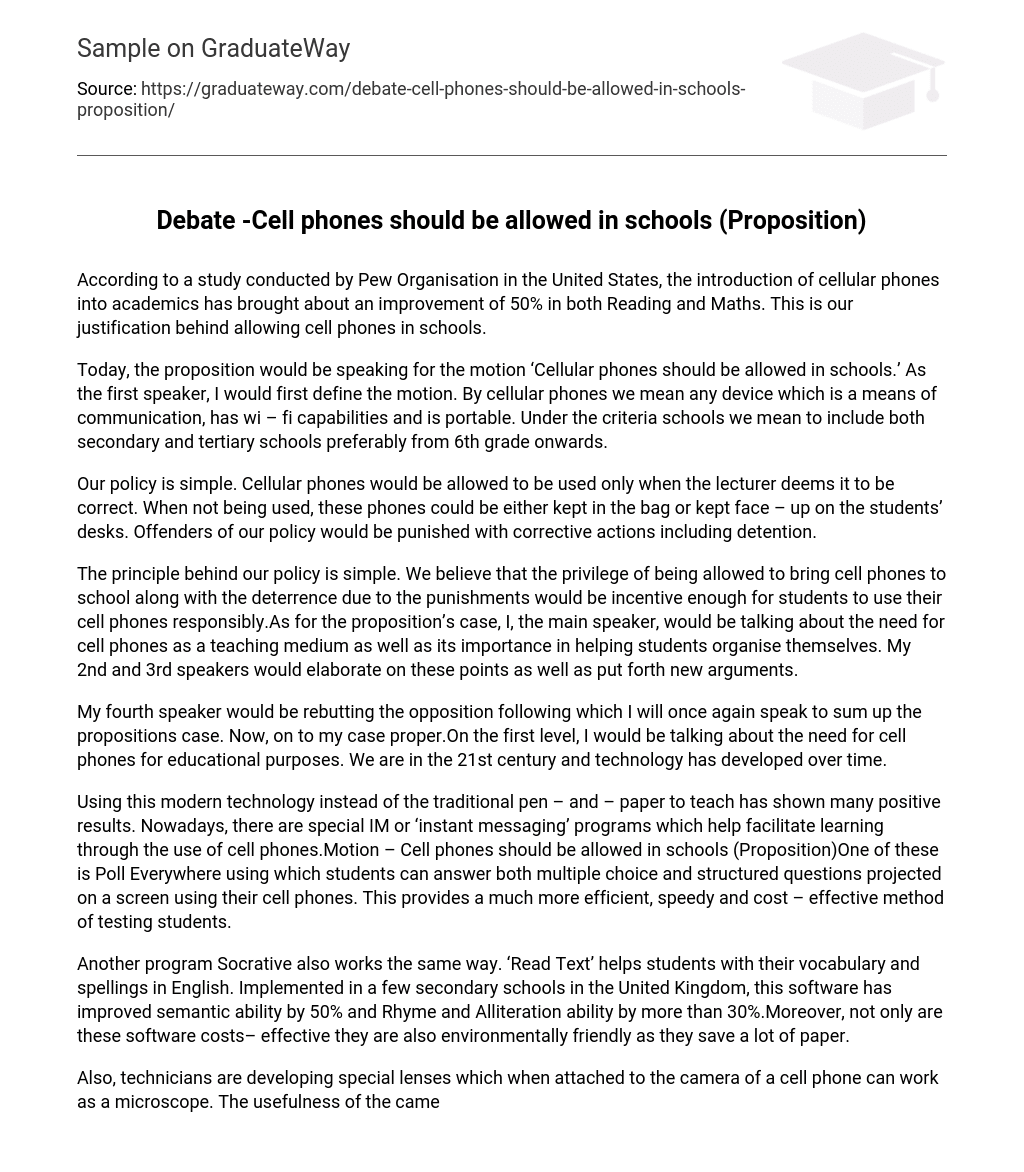According to a study conducted by Pew Organisation in the United States, the introduction of cellular phones into academics has brought about an improvement of 50% in both Reading and Maths. This is our justification behind allowing cell phones in schools.
Today, the proposition would be speaking for the motion ‘Cellular phones should be allowed in schools.’ As the first speaker, I would first define the motion. By cellular phones we mean any device which is a means of communication, has wi – fi capabilities and is portable. Under the criteria schools we mean to include both secondary and tertiary schools preferably from 6th grade onwards.
Our policy is simple. Cellular phones would be allowed to be used only when the lecturer deems it to be correct. When not being used, these phones could be either kept in the bag or kept face – up on the students’ desks. Offenders of our policy would be punished with corrective actions including detention.
The principle behind our policy is simple. We believe that the privilege of being allowed to bring cell phones to school along with the deterrence due to the punishments would be incentive enough for students to use their cell phones responsibly.As for the proposition’s case, I, the main speaker, would be talking about the need for cell phones as a teaching medium as well as its importance in helping students organise themselves. My 2nd and 3rd speakers would elaborate on these points as well as put forth new arguments.
My fourth speaker would be rebutting the opposition following which I will once again speak to sum up the propositions case. Now, on to my case proper.On the first level, I would be talking about the need for cell phones for educational purposes. We are in the 21st century and technology has developed over time.
Using this modern technology instead of the traditional pen – and – paper to teach has shown many positive results. Nowadays, there are special IM or ‘instant messaging’ programs which help facilitate learning through the use of cell phones.Motion – Cell phones should be allowed in schools (Proposition)One of these is Poll Everywhere using which students can answer both multiple choice and structured questions projected on a screen using their cell phones. This provides a much more efficient, speedy and cost – effective method of testing students.
Another program Socrative also works the same way. ‘Read Text’ helps students with their vocabulary and spellings in English. Implemented in a few secondary schools in the United Kingdom, this software has improved semantic ability by 50% and Rhyme and Alliteration ability by more than 30%.Moreover, not only are these software costs– effective they are also environmentally friendly as they save a lot of paper.
Also, technicians are developing special lenses which when attached to the camera of a cell phone can work as a microscope. The usefulness of the camera isn’t limited to this feature alone and in the future, there might be more inventions.Students and teachers can also make use of interactive features provided by certain software on cell phones such as polls, podcast, vodcast etc. Teachers can also post study materials on certain blogs which can be accessed by students possibly with a password to ensure no unauthorised use takes place.
Therefore, it is clearly seen that cell phones are ingenious devices when being used for educational purposes and by imposing a ban on them we are only fighting a losing battle which most educators today have accepted.On a second level, I would be talking about the use of cell phones in helping students organise themselves. Most educators believe that planning in itself is half the work done, and thus it is indeed important for students to organise themselves. Most students do not carry paper planners as they are bulky and much less efficient.
Cell phones however are much less bulky and at the same time much more efficient. The best examples of efficiency are homework reminders and calendar synchronisation.Motion – Cell phones should be allowed in schools (Proposition)Homework reminders help students become more responsible and regular in submitting homework. Calendar synchronisation allows teachers to integrate their calendars with those of their pupils.
This allows them to remind students of important dates and timings. Both these functions are served by calendars including the Google Calendar program. Once again, planners on cell phones are much more environmentally friendly than those made out of paper as they save paper and trees.Therefore, I would conclude by saying that allowing cell phones in schools would allow them to be used for educational purposes as well as for planning.
Our policy is beneficial not only to the students and teachers but also to the community. By banning cell phones we are only fighting a losing battle and thus I would request you all to go with our side of the house since we fight in the best interest of all.





